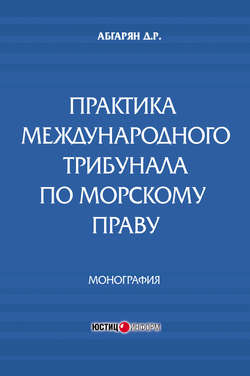Читать книгу Практика международного трибунала по морскому праву - Д. Р. Абгарян - Страница 3
Introduction
ОглавлениеIt has been almost 35 years since the mankind has decided to honor the difficult task of setting up the universal legal framework in the oceans. In 1982 the United Nations Convention on the Law of the Sea was adopted, which is called the «Constitution of the Oceans», because it establishes the basic provisions governing virtually all maritime activities, and in which the vast majority of states participate.
One of the many innovations introduced by the Convention is a mandatory dispute resolution procedure, which involves the choice of each party to the Convention of one or more of the judicial mechanisms, listed in the Convention, to resolve a dispute regarding the interpretation and application of its provisions. International Tribunal for the Law of the Sea is a new judicial body, which, along with optional competencies that all international courts and tribunals are endowed with, also has compulsory jurisdiction in respect of certain categories of disputes.
The comprehensive nature of the UN Convention on the Law of the Sea has made inevitable its compromise nature, that is, incomplete clarity of many of its provisions. Therefore, almost immediately after the formation of the Tribunal, states began to turn to the Tribunal because of the different legal positions held by them on certain aspects of the Convention. Pursuing resolution of disputes on the merits and establishing a procedural framework of the proceedings, the Tribunal is constantly faced with the need to interpret the many articles of the Convention, sometimes down to individual terms.
The Tribunal is of great importance because it also assesses the legal regulation of the extraction of mineral resources of the deep seabed which received the status of the common heritage of mankind, a completely new legal concept.
The Tribunal also has direct relevance for our country, as the Tribunal considers cases directly affecting the interests of the Russian Federation, as evidenced by the fact that in a number of cases decided by the Tribunal, the Russian Federation has performed both as a plaintiff and as a defendant. Knowledge of the basics of the Tribunal will also be important to protect the interests of the Russian Federation in the future. For proper evaluation of the Tribunal as a place in the system of peaceful settlement of international disputes, and its effectiveness in facilitating the establishment of a reliable rule of law in the oceans should carefully consider its methods of work and the position it occupies on specific issues.
The purpose of this paper is to examine the activities of the International Tribunal for the Law of the Sea and the elucidation of its effectiveness as a new international judicial institution.
For this purpose the author has dealt with the following issues:
– To analyze the place of the International Tribunal for the Law of the Sea in the system of settlement of international maritime disputes;
– Consider the competence of the Tribunal;
– Explore the role that international judicial institutions in general and in particular the Tribunal play in the development of international law;
– Trace the part of the Tribunal in the settlement of international disputes in different areas of ocean activities;
– To establish the specificity of the Tribunal’s decisions regarding the prompt release of vessels;
– To consider the role of the Tribunal on the issue of interim measures of legal protection;
– Analyze the process of resolving disputes regarding the interpretation and application of the UN Convention on the Law of the Sea;
– To investigate the activities of the Chamber for disputes concerning the international seabed area, in ensuring the cooperation of States in the use of resources in the area.
